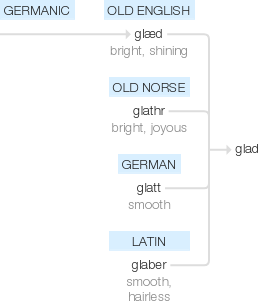Glad
Old English glæd (originally in the sense ‘bright, shining’), of Germanic origin; related to Old Norse glathr ‘bright, joyous’ and German glatt ‘smooth’, also to Latin glaber ‘smooth, hairless’.
wiktionary
From Middle English glad, gled, from Old English glæd(“shining; bright; cheerful; glad”), from Proto-Germanic *gladaz(“shiny; gleaming; radiant; happy; glossy; smooth; flat”), from Proto-Indo-European *gʰladʰ-, from *ǵʰelh₂-(“to shine”).
Cognate with Scots gled, glaid(“shining; bright; glad”), Saterland Frisian glääd(“smooth; sleek”), West Frisian glêd(“smooth”), Dutch glad(“smooth; sleek; slippery”), German glatt(“smooth; sleek; slippery”), Danish, Norwegian and Swedish glad(“glad; happy; cheerful”), Icelandic glaður(“glad; joyful; cheery”), Latin glaber(“smooth; hairless; bald”). Doublet of glatt.
glad (plural glads)
etymonline
glad (adj.)
Old English glæd "bright, shining, gleaming; joyous; pleasant, gracious" (also as a noun, "joy, gladness"), from Proto-Germanic *gladaz (source also of Old Norse glaðr "smooth, bright, glad," Danish glad "glad, joyful," Old Saxon gladmod, in which the element means "glad," Old Frisian gled "smooth," Dutch glad "slippery," German glatt "smooth"), from PIE root *ghel- (2) "to shine." Apparently the notion is of being radiant with joy; the modern sense "feeling pleasure or satisfaction" is much weakened. Slang glad rags "one's best clothes" first recorded 1902.
